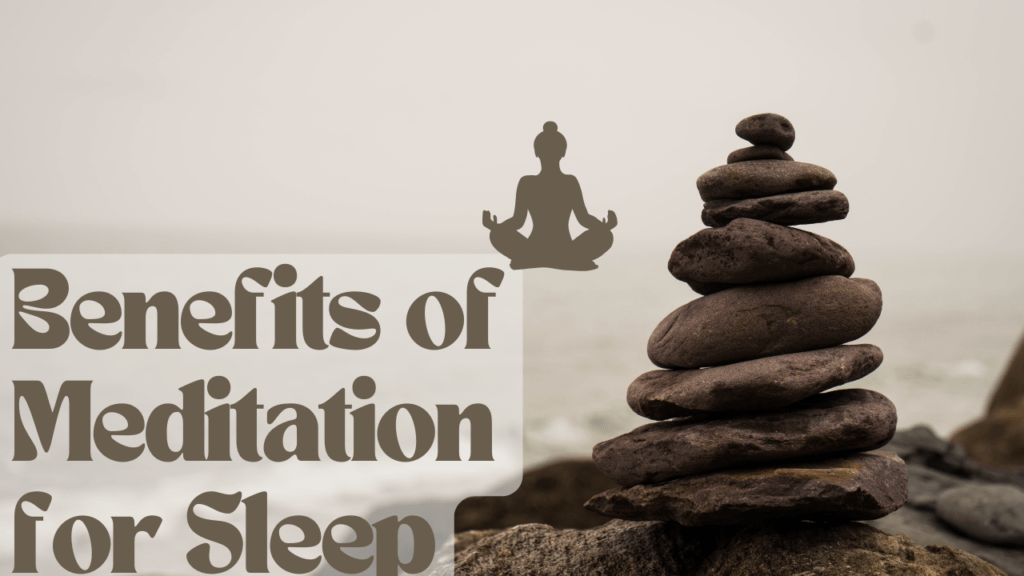Meditation can be a solution if you find it challenging to drift off to sleep at night.Do you toss and turn, worrying about the next day or ruminating over the past?Do you often rise in the morning feeling lethargic and lacking energy? If this resonates with you, know that you’re in good company. According to the World Health Organization, one in three people suffer from some form of insomnia1. Insomnia can have negative effects on your physical and mental health, such as increased risk of cardiovascular disease, diabetes, depression, and anxiety2.

Fortunately, there is a natural and effective way to improve your sleep quality and quantity: meditation. Meditation is a practice that involves focusing your attention on a single object, such as your breath, a word, a sound, or a sensation, and letting go of any distracting thoughts or emotions. Meditation can help you relax your body and mind, and prepare you for a restful and rejuvenating sleep. In this blog, we will explore how meditation works, what are the benefits of meditation for sleep, and how to do meditation for sleep.
How Meditation Works

Meditation triggers the parasympathetic nervous system, initiating the body’s “rest and rejuvenate” mechanism.. This response lowers your heart rate, blood pressure, and muscle tension, and increases your blood flow to the digestive and reproductive organs. Meditation also reduces the activity of the amygdala, which is the part of the brain that triggers the “fight or flight” response. This response increases your adrenaline, cortisol, and other stress hormones, and prepares your body for action. By calming down the amygdala, meditation reduces your stress levels and helps you feel more peaceful and relaxed34.
Meditation also influences your brain waves, which are the patterns of electrical activity in your brain. The brain operates with four primary wave frequencies: beta, alpha, theta, and delta. Beta waves are associated with alertness, concentration, and problem-solving. Alpha waves are associated with relaxation, creativity, and intuition. Theta waves are associated with deep relaxation, dreaming, and hypnosis. Delta waves are associated with deep sleep, healing, and regeneration. Meditation can help you shift from beta to alpha, and from alpha to theta, and even to delta, depending on the type and duration of meditation. By changing your brain waves, meditation can help you enter a state of deep relaxation and sleepiness56.
Benefits of Meditation for sleep

Meditation can help you sleep better in several ways. Some of the benefits of meditation for sleep are:
Meditation can help you fall asleep faster.
By relaxing your body and mind, meditation can help you let go of any worries, anxieties, or tensions that might keep you awake. Meditation can also help you create a positive bedtime routine, where you associate meditation with sleep, and signal your brain that it is time to wind down and rest7.
Meditation can help you sleep longer.
By reducing your stress levels, meditation can help you lower your cortisol and other stress hormones, which can disrupt your sleep cycle and cause you to wake up during the night. Meditation can also help you increase your melatonin, which is the hormone that regulates your circadian rhythm and tells your body when to sleep and when to wake up8.
Meditation can help you sleep deeper.
By changing your brain waves, meditation can help you enter a state of deep sleep, where your body and mind can heal and regenerate. Deep sleep is essential for your immune system, memory, learning, and mood.
Meditation can help you improve your sleep quality.
By enhancing your relaxation and sleep, meditation can help you wake up feeling refreshed, energized, and ready for the day. Meditation can also help you improve your daytime functioning, such as your focus, productivity, creativity, and emotional well-being.

How to Do Meditation for Sleep
https://www.youtube.com/watch?v=aEqlQvczMJQ&pp=ygUeSG93IHRvIERvIE1lZGl0YXRpb24gZm9yIFNsZWVw
There are many types of meditation that you can do for sleep, such as guided sleep meditation, mindfulness meditation, mantra meditation, breathing meditation, body scan meditation, and progressive muscle relaxation. You can select the one that aligns with your tastes and requirements.. Here are some general tips on how to do meditation for sleep:
Find a comfortable and quiet place to meditate, preferably in your bedroom or somewhere close to your bed. You can sit, lie down, or even do meditation in bed, as long as you are comfortable and relaxed.
Set a timer for the duration of your meditation, such as 10 minutes, 20 minutes, or 30 minutes. You can also use a guided sleep meditation video or audio, which will guide you through the meditation and tell you when to end.
Start by taking a few deep breaths, and notice how your body feels. Scan your body from head to toe, and release any tension or tightness that you find. Relax your muscles, your face, your jaw, your eyes, and your forehead.
Choose a focus for your meditation, such as your breath, a word, a sound, or a sensation. Bring your attention to your focus, and gently observe it without judging, analyzing, or controlling it.Should your thoughts drift, gently guide them back to your center.
Continue to meditate until your timer goes off, or until you feel sleepy enough to drift off. If you are using a guided sleep meditation, you can let the voice guide you into sleep. If you are doing meditation on your own, you can end the meditation by slowly opening your eyes, or by simply falling asleep.
Conclusion
Meditation is a powerful and natural way to improve your sleep. By relaxing your body and mind, reducing your stress levels, changing your brain waves, and creating a positive bedtime routine, meditation can help you fall asleep faster, sleep longer, sleep deeper, and improve your sleep quality. Meditation can also help you improve your daytime functioning, such as your focus, productivity, creativity, and emotional well-being. Try meditation for sleep tonight, and see the difference for yourself.

